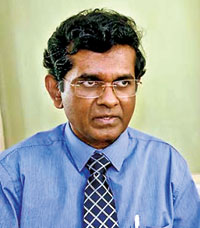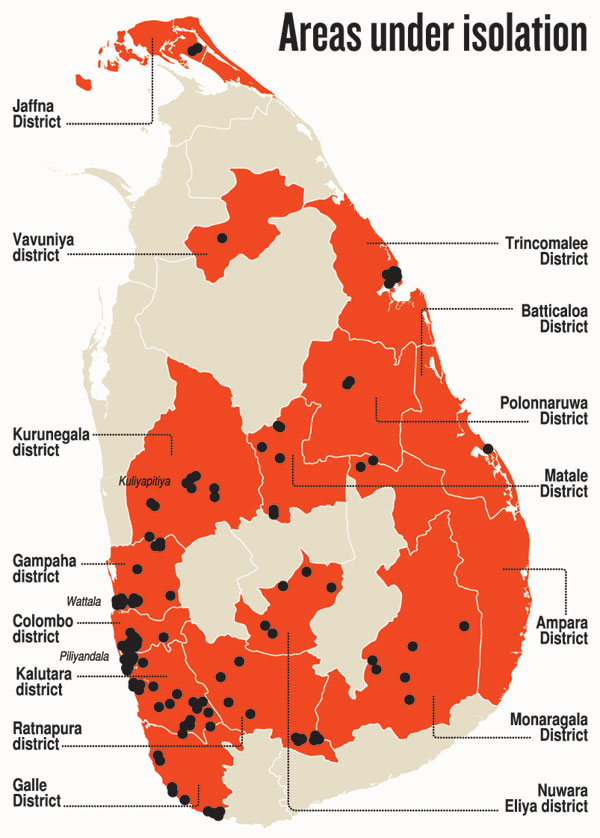News
It’s critical to protect oneself against COVID-19 before we get to a point of no return
Prevention of COVID-19 is critical, said a senior clinician, urging that everyone including the authorities should realize that whatever facilities Sri Lanka has can reach saturation at a certain point.
Senior Consultant Physician Dr. Ananda Wijewickrama of the National Institute of Infectious Diseases (NIID or IDH), Angoda, stressed that it is happening in India. They have come to a situation like this because they have exceeded their capacities in a very short period of time. Even in the United Kingdom (UK), they had to convert the London Convention Centre which is a huge space to a hospital.

Dr. Ananda Wijewickrama
He showed the way how to protect oneself against COVID-19 and protect others if one gets infected. An infected person can spread the virus to others during the first 10 days (mostly during 5-7 days), so, it is important for that person to wear a face-mask and also adhere to all health precautions.
“Vaccination is important but might not protect against infection and infecting others,” said Dr. Wijewickrama, adding that whether infected or non-infected, people with chronic illnesses should take their long-term regular medication without fail.
Here is what Dr. Wijewickrama elaborated on, when the Sunday Times asked him what people should do to prevent getting COVID-19 and also, if positive, what course of action they need to follow at home while awaiting transfer to a treatment centre.
To prevent getting COVID-19:
- Wash your hands properly with soap. When soap is not available use a sanitizer
- Wear your face-mask properly
- Keep physical distance scrupulously
- Avoid crowded places/public gatherings
- Have good ventilation wherever you are
Face-masks
One face-mask, a surgical mask, is adequate if it is worn properly. There is no harm in wearing two masks if you are more comfortable with that, but they have to be worn properly.
If surgical masks are not available, a cloth mask which can be washable is better than having no mask.
The important thing is that in an area where people are moving about/ gathering such as an office or bus, everybody should wear a mask properly.
Dr. Wijewickrama reiterates that there is no use in resorting to the following measures to prevent getting COVID-19: Taking dexamethasone (a steroid), Vitamin D, Vitamin C, Vitamin E or green tea or performing steam inhalation. The best prevention methods are those given earlier.
Other measures to improve immunity:
- Do regular exercises
- Eat a balanced diet
- Stop smoking and if you don’t smoke avoid any environment where others smoke
Once you give a sample for RT-PCR testing and until the results are made available:
- Isolate yourself at home
- Rest
- Practise hand-washing, face-mask wearing and physical distancing
- Avoid public transport and public places
If the RT-PCR test is positive and until admission to a treatment facility:
- Stay at home. Leave home only for medical care. Don’t go to any public place or use any public transport including taxi-sharing
- Take physical rest
- Take adequate hydration (drink water and other fluids)
- If you have fever/body aches, take paracetamol in the right dosage at the right intervals. If necessary, take medication for nausea and vomiting
- Get immediate medical attention if you have trouble breathing; have any other emergency warning signs; or you think it is an emergency (See box).
- Tell your close contacts that they may have been exposed to COVID-19. An infected person can spread COVID-19 starting 48 hours (or 2 days) before the person has any symptoms or tests positive.
Self-monitoring at home to get an early indication of severe disease, while awaiting transport to a hospital:
Some patients with an initial mild clinical presentation may worsen in the second week of illness, stresses Dr. Wijewickrama, explaining that the decision to monitor these patients in the inpatient or outpatient setting should be made on a case-by-case basis.
He says: “This decision will depend not only on the clinical presentation, but also on the patient’s ability to engage in self-monitoring, the feasibility of safe isolation at home and the risk of transmission in the patient’s home environment.”
The needs while at home:
- A separate bathroom is ideal for the patient. If this is not feasible, care should be taken to disinfect the bathroom (particularly surfaces such as taps, door handles, commode flushing handles etc., the patient has touched.
- Make sure that the patient has access to food and other necessities
- Make sure that the patient and family members adhere to recommended precautions including wearing a mask when the necessity arises
| Emergency warning signs If someone who is home shows any of these signs, seek emergency medical care immediately, says
Other reasons for early admission:
| |



